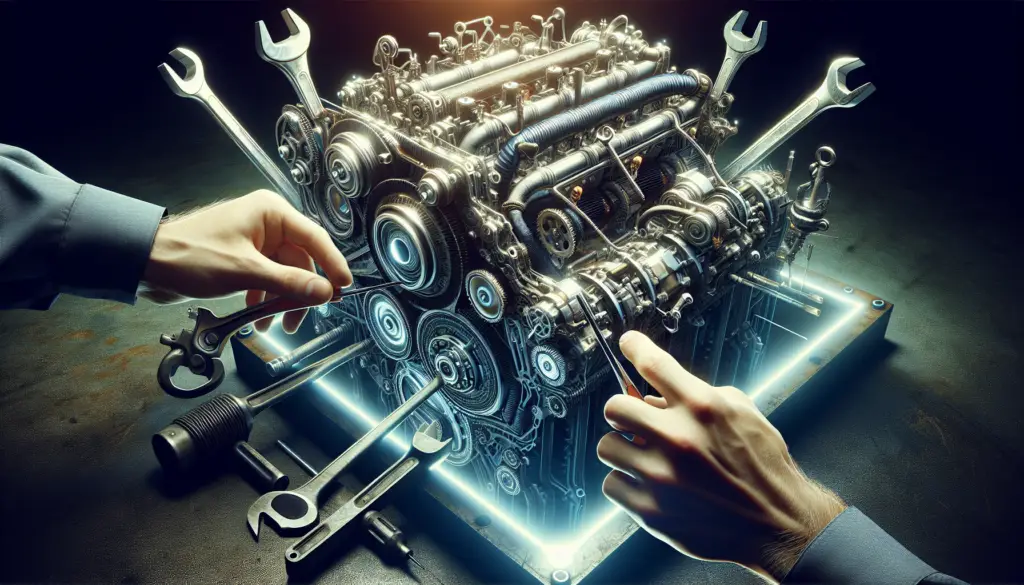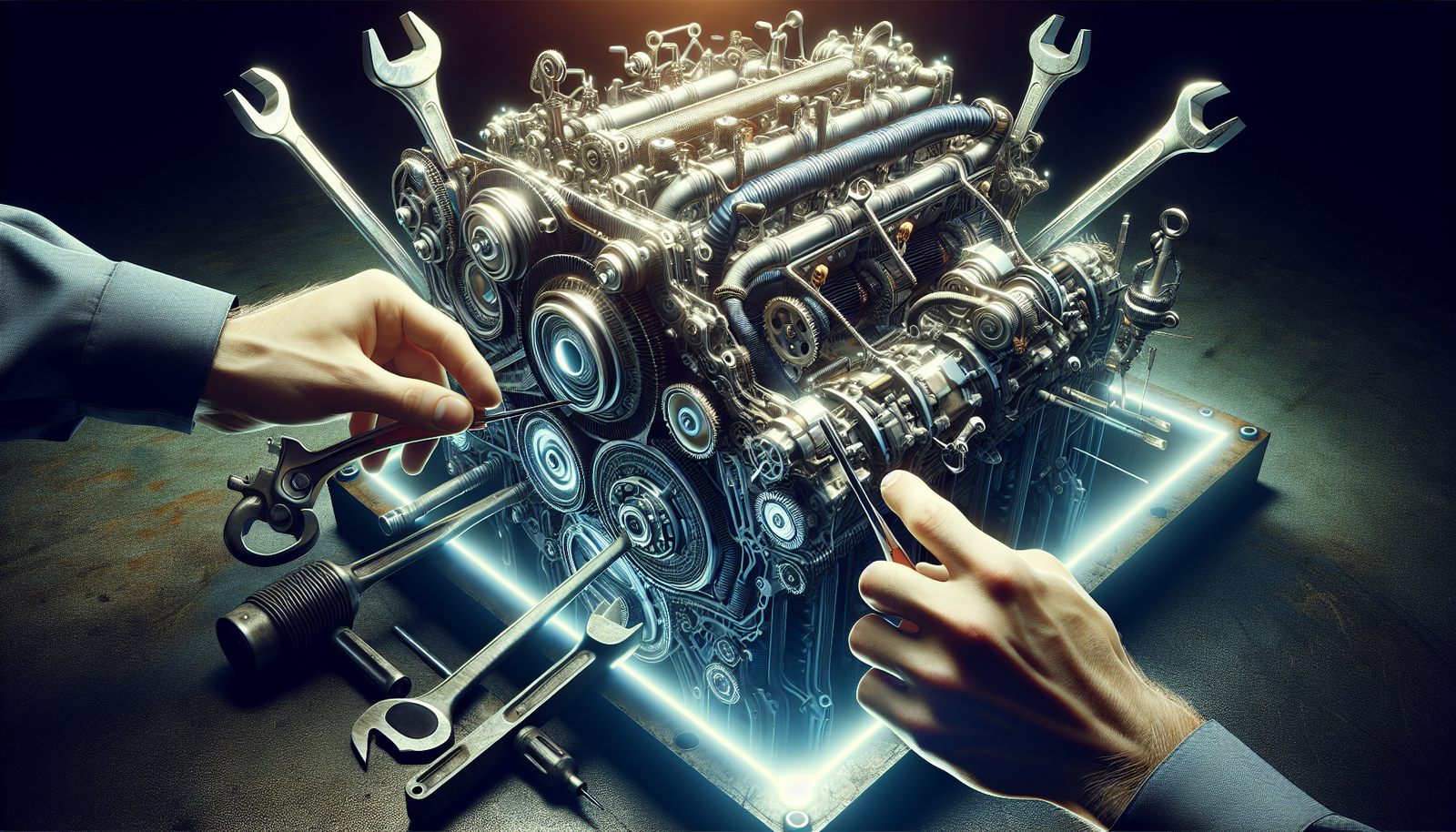In the thrilling world of boating, one must never neglect the importance of a well-maintained engine. As you navigate through the waves of the wide open sea, your boat’s engine plays a massive role in determining how smooth or daunting your journey may be. “How To Properly Service Your Boat Engine’s Cooling System” equips you with essential knowledge and an expertly laid out step-by-step guide to ensure your engine’s cooling system runs efficiently. This article does not just teach you how to keep your boat’s engines in check, it also reduces the risk of unexpected costly repairs and improves your boat’s performance. So, gear up and get ready to master the art of effectively servicing your boat’s engine cooling system.

Understanding the Basics of a Boat Engine Cooling System
If you’re a boat owner, knowing how to properly maintain your boat is paramount. One key area to focus on is your boat’s engine cooling system. This is crucial because a well-maintained cooling system ensures that your boat’s engine operates at optimal temperature, averting damage caused by overheating.
Significance of a Cooling System
Why is a boat engine cooling system so significant? Well, you can compare your boat’s engine to the human body. When you’re engaged in intense physical activity, your body sweats to cool off, right? Similarly, your boat’s engine generates considerable heat when it’s running, and it needs a cooling system to prevent it from overheating. A well-functioning cooling system is critical to the longevity and performance of your boat’s engine.
Different Types of Cooling Systems
Now, there are essentially two types of cooling systems in boats – raw water cooling systems and closed cooling systems. As the name implies, raw water cooling systems use the surrounding sea, lake, or river water to cool the engine. On the other hand, closed cooling systems contain coolant fluid and do not directly expose the engine to potentially corrosive raw water. Either of these systems can be found on different types of boats, and each has its perks and disadvantages.
Components of a Boat Cooling System
Understanding the components of your boat’s cooling system can make maintenance a less daunting task. Predominantly, it comprises the water pump, thermostat, impeller, heat exchanger, and the coolant fluid or raw water. These components work in tandem to handle heat generated by the engine, ensuring it runs smoothly and efficiently.
Recognizing the Importance of Regular Maintenance
A significant part of boat ownership requires conducting regular maintenance checks on your boat engine’s cooling system.
Preventing Engine Overheating
By carrying out consistent maintenance checks, you can prevent your boat’s engine from overheating. A cooling system in mint condition ensures the engine operates at its ideal temperature, hence preventing potential damage caused by excessive heat.
Slowing Down Wear and Tear
Maintenance also helps slow down the wear and tear of your engine. Over time, components of the cooling system like the water pump and impeller can become less efficient due to wear. Regular checks and timely replacements can help conserve these components and by extension, your engine.
Enhancing Engine Performance
Proper maintenance is pivotal to enhancing your engine’s performance. A cooling system that functions optimally ensures the engine works as efficiently as possible, improving your overall boating experience.
Reducing Costs in the Long Run
While regular maintenance might seem like an added expense, it eventually saves costs in the long run. By catching potential issues early and preventing engine damage, you save yourself from hefty repair or replacement expenses.
Preparing for the Maintenance Process
Now, let’s delve into how you can prepare for the maintenance process.
Gathering Necessary Equipment and Tools
First off, ensure you have all the necessary tools and equipment. This can include items like a flush kit, wrench, screwdriver, coolant, replacement parts, and an oil pan for collecting old coolant.
Scheduling Maintenance
It is also important to schedule maintenance times. Doing so allows you to have consistent checks and fixes that can prevent potential engine damage. Some boating experts recommend checking your engine’s cooling system at least once per year.
Securing a Suitable Working Space
Having a suitable working space is crucial. The area should be clear of distractions and hazards, adequately lit, and have enough room for you to move around freely.

Inspecting the Whole Cooling System
Having prepared for the maintenance process, there are several things you should inspect.
Examining the Cooling Water Flow
Start by examining the cooling water flow. If the flow appears to be inadequate, then there could be an issue with the water pump or impeller.
Checking the Thermostat
Next, check your thermostat. Ensure it opens and closes accurately to maintain the optimal engine temperature.
Looking for Leaks or Corrosion
Additionally, look out for any leaks or signs of corrosion within the system. Leaks could lead to insufficient coolant levels, while corrosion could cause further damage to other parts.
Cleaning the System
A clean system operates much more efficiently than a dirty one. Here’s how to go about it.
Draining and Flushing the Cooling System
Begin by draining the old coolant from the system. Then, using a flush kit, thoroughly flush the system to get rid of any debris or old coolant residue.
Removing Debris and Scale Build-up
Ensure there are no debris or scale deposits in your cooling system. These can hinder the efficient flow of coolant, thereby impacting your boat’s performance.
Cleaning the Strainer or Filter
Remember also to clean your strainer or filter. These components prevent debris from getting into your cooling system and should be kept clean at all times.
Conducting Repairs and Parts Replacement
Once your system is clean, inspect it for any necessary repairs or parts replacements.
Assessing Component Damage
Check all the components of your cooling system for any wear or damage. This includes your water pump, impeller, thermostat, and heat exchanger.
Replacing Worn-Out Parts
If you find any parts that are worn-out or damaged, replace them immediately. Failure to do so might result in further damage to your engine.
Sealing Leaks or Cracks
In case you spot any leaks or cracks in your cooling system, seal them as soon as possible. Unattended leaks or cracks could lead to coolant leakage, causing your engine to overheat.
Repairing or Replacing the Water Pump
The health of your water pump is critical as it pumps coolant through the cooling system. If it’s damaged, repair or replace it promptly to prevent the engine from overheating.
Replacing the Thermostat
If your thermostat inspection has shown it to be faulty or not working optimally, replace it. An operational thermostat helps maintain the engine’s optimal operating temperature.
Refilling the Cooling System
Once repairs and replacements are done, it’s time to refill the cooling system.
Choosing the Right Coolant
Pick the appropriate coolant for your boat’s engine. Always refer to your manufacturer’s guidelines for the best coolant to use.
Filling up the Coolant to the Recommended Level
When refilling, ensure that you fill it up to the recommended level. Overfilling or underfilling could negatively affect the performance of your engine.
Checking for Leaks After Refill
After reloading the coolant, look out for any leaks. If found, they should be sealed promptly to prevent coolant loss.
Troubleshooting Common Problems
Even with proper maintenance, you might still encounter a few hiccups with your cooling system.
Addressing Inadequate Water Flow
In case of inadequate water flow, check the impeller and water pump for any damage. If found, replace these parts to improve the flow.
Fixing Overheating Issues
If your engine is frequently overheating, your cooling system might be to blame. Troubleshoot by checking the coolant levels or inspecting the thermostat.
Dealing with Excessive Corrosion or Scaling
Heavy scaling or corrosion can cause significant damage within your system. Dealing with this requires a thorough cleaning or even replacing the affected parts to maintain the system’s efficacy.
Proper After-Maintenance Care
After the maintenance, it’s essential to care for your cooling system.
Allowing the Engine to Cool Down
After servicing your boat’s engine, allow it to cool down before storage. This helps in the efficient circulation of the coolant within the system.
Ensuring Proper Storage
Store your boat in a cool, dry place, away from elements that could cause damage to the cooling system and other parts of the boat.
Regularly Monitoring the Cooling System
Even after maintenance, consistently monitor your cooling system to ensure it’s functioning optimally. Early identification of any faults can save you hefty repair costs in the future.
Seeking Professional Help When Necessary
Last but not least, recognize when it’s time to seek professional help.
Deciding When to Consult a Mechanic
When you’re faced with complex cooling system issues that you can’t resolve yourself, it’s time to consult a mechanic.
Choosing a Reliable Marine Mechanic
When selecting a mechanic, ensure they are reliable and well-versed with marine engines like yours. This guarantees that your boat is in good hands.
Understanding Common Mechanical Services for Marine Engines
Knowing the typical services offered by marine mechanics helps you understand what needs to be done and what to anticipate. This includes things like engine diagnostics, repairs, parts replacements, and overall system maintenance.
In conclusion, it’s clear to see that the maintenance of your boat’s cooling system is essential. Not only does it prevent potential damage to your engine, but it also improves performance and longevity. Embrace regular maintenance, carry out timely repairs, and never hesitate to seek professional help when needed for the love of boating!

